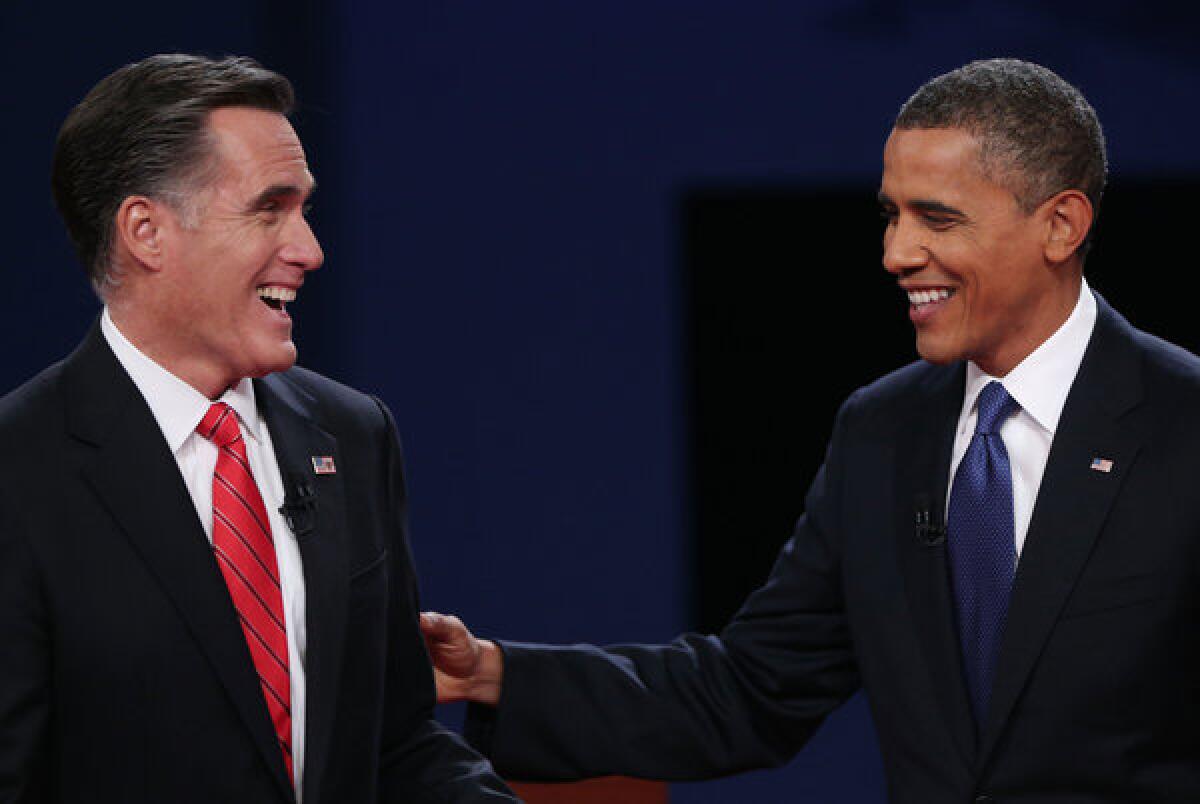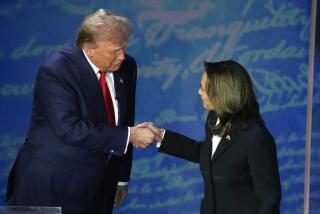Romney sharp and steady in first presidential debate

- Share via
DENVER — In the first presidential debate of the fall campaign, neither Mitt Romney nor President Obama appeared to land a knockout blow or commit the sort of serious blunder that would instantly change the presidential race.
The Republican challenger held his own during a 90-minute encounter that revolved almost exclusively around domestic issues.
Romney, offering sharper answers than Obama and seizing control of the debate at several points, was never ruffled, repeatedly predicting that Obama would provide more “trickle-down government” if he were reelected in November. He defended himself against charges from Obama that his tax cut plan would favor the wealthy.
For his part, Obama tried to bury his opponent in the very thing that Romney is said to crave: data. Repeatedly referring to arguments offered by his leading surrogate, former President Clinton, Obama tried to rebut Romney’s claim that he could balance the budget while cutting tax rates across the board and increasing military spending by $2 billion.
“Math, common sense and our history shows us that’s not a recipe for job growth,” Obama said.
But Obama sometimes appeared to struggle to offer fluid descriptions of his own policies — including on healthcare. His campaign appeared to acknowledge that it hadn’t been his best night.
“Mitt Romney, yes, he absolutely wins the preparation, and he wins the style points,” Obama deputy campaign manager Stephanie Cutter said on CNN. “But that’s not what’s been dogging his campaign. What’s been dogging his campaign are the policies that he doubled down on tonight.”’
Cutter said that “we feel pretty good about the president’s performance here tonight. Again, he wasn’t speaking to the people in this room. He wasn’t speaking to the pundit class. He was speaking to the people at home.”
Romney’s campaign policy director, Lanhee Chen, described Obama as “flatfooted” and said the president gave answers that “were kind of meandering at times. … I wasn’t sure what the points were.” By contrast, he said, Romney delivered his responses “clearly, crisply and concisely.”
Obama repeatedly avoided opportunities to take personal shots at his rival, even when offered clear openings. The president had one when Romney tried to rebut a charge that he favored tax breaks for U.S. companies that ship jobs overseas.
“Look, I’ve been in business for 25 years. I have no idea what you’re talking about. I maybe need to get a new accountant,” Romney said. Obama’s campaign has hammered the Republican for months over accusations that he profited from shipping jobs overseas and over his personal taxes, which include offshore accounts—but the president did not respond.
Similarly, Romney’s comments about the 47% of Americans who paid no federal income tax last year, the subject of heavy attack advertising by the Obama campaign, was never brought up by the president.
Romney, on the other hand, whose advisors said he’d deliver “zingers,” managed to get several in. Asked for specific programs he’d cut, he offered nothing that would make a serious dent in the federal deficit. But in a memorable line, Romney turned to debate moderator Jim Lehrer and said, “I’m sorry, Jim, I’m going to stop the subsidy to PBS…. I like PBS, I love Big Bird, I actually like you too, but I am not going to keep spending money on things to borrow money from China to pay for.”
Tangling over healthcare, the candidates offered clear differences. Romney argued that the law was keeping businesses from hiring, would force doctors to drop patients and cost Americans money. He summed it up neatly: “So, it’s expensive; expensive things hurt families.”
Romney also echoed a Democratic criticism of the president, saying that Obama spent “his energy and passion for two years fighting for Obamacare instead of fighting for jobs for the American people.”
Obama noted that policies in his healthcare law were once supported by Republicans and were modeled on the law Romney passed as governor of Massachusetts.
“This was a bipartisan idea. In fact, it was a Republican idea. And Gov. Romney at the beginning of this debate wrote and said what we did in Massachusetts could be a model for the nation.”
In his closing statement Obama offered a self-deprecating appeal for voters who still like the president but feel disappointed by his failure to make more progress in delivering on his 2008 campaign promises.
“You know, four years ago I said that I’m not a perfect man and I wouldn’t be a perfect president. And that’s probably a promise that Gov. Romney thinks I’ve kept,” Obama said. “But I also promised that I’d fight every single day on behalf of the American people and the middle class and all those who are striving to get in the middle class.
“I’ve kept that promise, and if you’ll vote for me, then I promise I’ll fight just as hard in a second term.”
Except for brief closing references to the situation in the Middle East by both men, the economy and other domestic issues were the only topics discussed.
In something of a reversal, Romney appeared more moderate on several issues than he had been during the Republican primaries.
Romney spoke warmly about “green” energy — an Obama staple — and indicated that tax breaks for the major oil companies would probably fall by the wayside if he were elected president. But at the same time he took repeated shots at Obama’s use of federal subsidies for green-energy investments, including for Solyndra, the California solar energy firm that went bankrupt.
“I had a friend who said you don’t just pick the winners and losers, you pick the losers,” Romney said.
Romney also had qualified praise for provisions in the Dodd-Frank financial regulation law that he wants to repeal. He also said that he and Obama had similar ideas about Social Security and would largely avoid restructuring the program, even though he has suggested that it could well be necessary to raise the retirement age for eligibility.
Romney said Obama was running on the same platform as four years ago, while the Republican promised to generate more jobs by going to the assistance of small businesses.
Obama, given the first chance to say what he would do to spur more hiring, said he would also promote jobs by using money saved from the winding-down of the wars in Afghanistan and Iraq to rebuild America.
Leveling a familiar charge that Romney would offer more tax breaks for the wealthy, Obama said his alternative would be “a new economic patriotism that says America does best when the middle class does best.”
Obama opened by wishing a happy anniversary to his wife, Michelle, whom he married 20 years ago. He promised her that next year they wouldn’t be celebrating before 40 million people.
Romney joined in, offering congratulations and drawing a laugh from Obama by joking that “this is the most romantic place you could imagine” to be celebrating: “Here with me.”
He also shot back at Obama’s charge over taxes, saying that cutting taxes on the rich was “not what I’m going to do.” He said the rich would pay the same share of taxes as they do now under his plan.
Answering one question that had been hanging over the event, Lehrer said that the questions would be about domestic issues. There had been some speculation that foreign policy might be one of the discussion topics in the wake of the recent killing of the U.S. ambassador and three other Americans in Libya.
Romney is lagging in the polls, but he took the stage at Wednesday night’s debate with some key advantages that could help him catch Obama.
The Republican candidate was in position to surprise the public with a strong performance; recent polls showed that most voters expected Obama to get the better of his opponent. But Romney performed well in the 19 Republican primary-season debates, often coming across as presidential and rarely slipping up.
Another factor that figured to work to Romney’s benefit: The challenger typically has a built-in edge in the first presidential debate. Merely sharing the stage with the president helps to close any stature gap in voters’ minds.
In the pre-debate spin, the Obama camp underscored that point, as both sides worked overtime to limit any gain by the other side. “If history tells us anything it’s that, as the challenger, Mitt Romney is likely to be called the winner by pundits,” Cutter had said in a memo to reporters.
At the same time, Romney faced substantially greater pressure than Obama heading into the 90-minute encounter. For a trailing candidate, simply holding one’s own isn’t good enough.
With less than five weeks until election day, most opinion surveys show Obama with a small but persistent lead nationally and in swing states that will decide the contest. By contrast, Romney has never been ahead of Obama in the Real Clear Politics average of national polls dating back to the start of the year.
Follow Politics Now on Twitter and Facebook
Paul.west@latimes.com
Kathleen.hennessey@latimes.com
More to Read
Get the L.A. Times Politics newsletter
Deeply reported insights into legislation, politics and policy from Sacramento, Washington and beyond. In your inbox twice per week.
You may occasionally receive promotional content from the Los Angeles Times.











